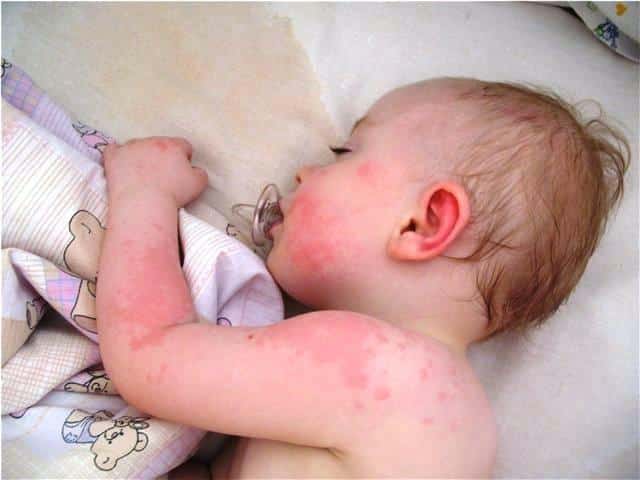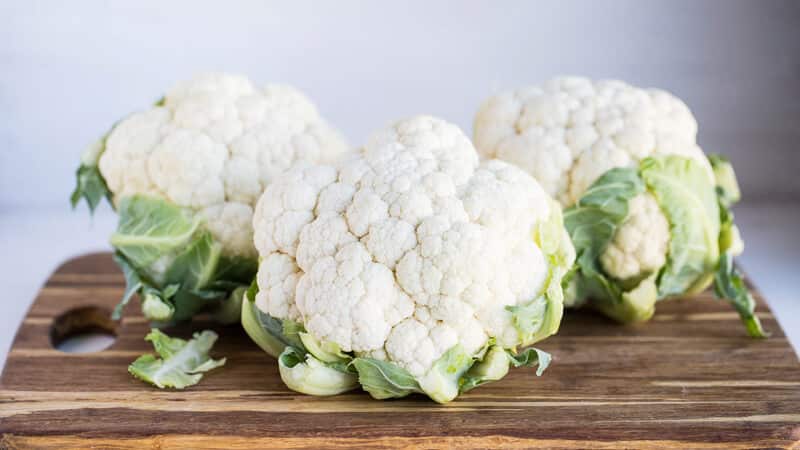Is there an allergy to cauliflower in infants?
Every mother cares about the nutrition of her child. Parents often have questions about the usefulness of certain products, including hypoallergenic ones. Cauliflower is one of these vegetables. We will talk about its beneficial properties and contraindications for use. Let's find out whether cauliflower can cause an allergic reaction in babies, consider its symptoms and treatment.
Are infants allergic to cauliflower?
Cauliflower is one of the first to be introduced into complementary foods. It is considered hypoallergenic because it rarely causes a negative reaction. This is a nutritious product that is easily mashed, has a mild taste, and goes well with other vegetables.

Causes of allergies
Cauliflower is a hypoallergenic product, but can still cause an allergic reaction.
Reference. Cauliflower contains active enzymes - chitinases. Their lytic properties help in the decomposition of chitin, which is found in the stem and root system of the plant. This enzyme can cause an allergic reaction.
Several factors can contribute to the appearance of an allergy to cauliflower:
| Cause of allergy | Description |
| Heredity | There are allergy sufferers among relatives.
The mother is allergic to this product. The antibodies she produces enter the baby's body through breast milk. |
| Internal and external factors |
These factors put a heavy burden on the baby’s body. The result is a negative reaction of the body’s immune system. |
| The product was introduced into the child’s diet too early | His immunity has not yet been formed. Some of the antibodies are passed on to the baby through mother's milk. Cells that are responsible for immunity can give an inadequate response to active substances that enter the blood from digested food. Therefore, it is necessary to begin introducing a new product gradually and slowly. |
| Greenhouse or imported cauliflower | Chemicals used during plant growth:
|
| The product is administered to the baby in large quantities | An immature immune system can react negatively to a large amount of a new product entering the child’s body. |
| The mucous membrane of a child's stomach is highly sensitive | When vegetable protein enters the baby's stomach, irritation of the mucous membrane begins. |
Is it suitable for first feeding?

Cauliflower is one of the healthy foods for babies. Since after cooking cabbage becomes soft and tender, it is well suited for making purees for a child.
Specialists in the field of nutrition, gastroenterology, allergists, and pediatricians consider cauliflower ideal for first complementary feeding:
- this is a hypoallergenic product with a low risk of allergic reactions in children under 1 year of age;
- contains little fiber, which can cause bloating and flatulence in the intestines that are not yet ready for such food;
- when cooked it has a pleasant taste and soft texture;
- contains microelements necessary for a child: magnesium, phosphorus, iodine, sodium, potassium, iron, cobalt, calcium;
- contains vitamins important for development: A, C, PP, E, H;
- suitable for the prevention of iron deficiency anemia;
- benefits the development of the infant's nervous system;
- promotes the formation of healthy intestinal microflora.
Still, cauliflower is not suitable for all children. Before introducing this vegetable into complementary foods, read the list of contraindications:
- cauliflower should not be given to children prone to allergic reactions;
- if there are symptoms of an intestinal disorder, then it is better to postpone complementary feeding with this vegetable until 8 months,
- kidney problems.
If a child experiences abdominal pain, constipation or diarrhea, the product should be discontinued; individual intolerance to this vegetable is possible.
How to make cauliflower puree for your child:
- The head of cabbage should have dense white inflorescences, without black spots. If you choose frozen cabbage, it must be a proven brand.
- Before cooking, fresh cabbage is separated into inflorescences and washed well. Fill with salted water for 30 minutes. This will get rid of insects and fertilizer residues.
- Cooking time is no more than 10 minutes, otherwise the cabbage will turn into porridge.
- Grind the vegetable using a blender, adding a little broth or water.
- The puree should be smooth, without lumps, like sour cream.
It is better to prepare puree for your child yourself from fresh vegetables. Store-bought cans may contain additives and preservatives that are undesirable for the baby.

Symptoms and reactions to cauliflower in a child
A food allergy to cauliflower manifests itself as one or more symptoms:
- Rashes appear on the face, lips and tongue.Swelling and tingling appear.
- A rash and red spots may appear on the body, accompanied by severe itching.
- Watery eyes and clear nasal discharge,
- Disturbances in the digestive tract: gas formation, diarrhea, bloating, green stools.
- The mucous membranes of the eyes and nose become inflamed.
- Bronchial spasms, cough, respiratory dysfunction, wheezing when breathing.
- The nasolabial triangle may turn blue.
- Quincke's edema, anaphylactic shock and angioedema of the intestine develop in the most severe cases.
In infants, the rash often appears in folds on the body, where sweating is increased.
Rarely, limbs may swell and body temperature may rise. The child may refuse to eat, sleep poorly and be capricious due to the severe discomfort that occurs with food allergies.
After the child has received the first portion of this product, you should wait 24 hours. During this time, do not introduce cabbage or any other new foods. Monitor your child's reaction - during this time the first symptoms of an allergic reaction may appear.
Important. Even at the slightest sign of allergy, show your child to a pediatrician. Self-medication is dangerous for his life and health.
Treatment and prevention of allergies

If a child develops an acute food allergy, complex treatment with special medications is carried out. They neutralize allergens and have a sedative effect on the immune system.
Along with medications, the child and mother are prescribed a special diet that takes into account the individual characteristics of the baby. The diet must be hypoallergenic.
If the allergy is caused by a congenital or chronic disease, then additional treatment is prescribed to eliminate it.
For mild symptoms that do not pose a threat to the health and life of the baby, the doctor does not prescribe strong drugs.
Important. Treatment with antihistamines is not always safe. Such drugs often have side effects that adversely affect the child’s condition. He may experience lethargy, drowsiness and lethargy.
For severe allergic reactions, the doctor prescribes treatment, including the following drugs:
- External products: ointments and creams that have anti-inflammatory and sedative effects. They will relieve swelling and irritation of the skin, relieve rashes and itching. Drugs such as Advantan (hormonal), Fenistil (non-hormonal) gel, etc.
- Antihistamines: The child must buy only those drugs that are intended specifically for children. Children's "Suprastin", "Fenistil", "Zirtek", etc.
- Enzymatic enterosorbents: "Polyphepan" and activated carbon. They are taken to stop nutrients from entering the bloodstream that are bad for the immune system, as well as to cleanse the body of toxic compounds. They are often prescribed for severe swelling to reduce the risk of anaphylactic shock.
To provide emergency medical care, doctors have the right to use hormonal-based drugs - Prednisolone, Hydrocortisone.
To relieve itching and other allergy symptoms, doctors advise bathing the child in a bath with the addition of herbs such as chamomile, string, oak bark, and wormwood.
Important! Only the attending physician has the right to prescribe any medications.
How to prevent an allergic reaction in a baby:
- Do not give him more than two foods at once during the first feeding.
- When breastfeeding follow a hypoallergenic diet. With milk, the baby gets substances that are contained in the mother's food products, they can cause allergies.
- Buy only fresh products. Feed your baby self-prepared meals.
- If a child has a hereditary predisposition to allergies, it is worth protecting him from any allergens.
The immune system reacts negatively to cauliflower due to the fact that it contains chitinase. These enzymes are highly active, so the child’s body perceives them as a threat and sends antibodies to eliminate it.
This is interesting:
Symptoms and treatment of broccoli allergy in infants
Are infants allergic to buckwheat?
Is it possible to eat broccoli during pregnancy, in what form and quantity?
Conclusion
A food allergic reaction is a common condition. To reduce their risks, it is recommended to continuously improve the child’s immunity. If he is prone to allergies, a special hypoallergenic diet is necessary. In addition to the internal impact of allergens on the body, there may also be an external impact - sometimes even the smell of a vegetable triggers a reaction.